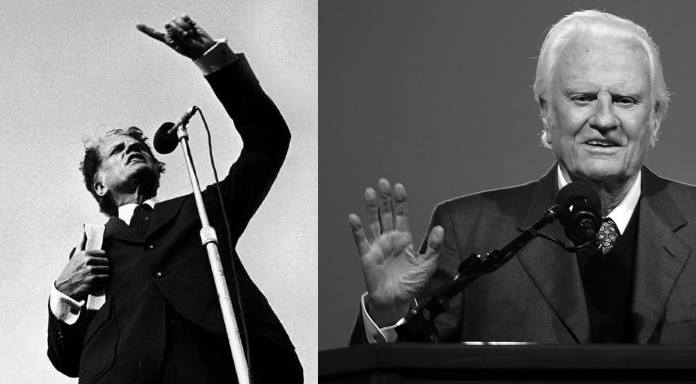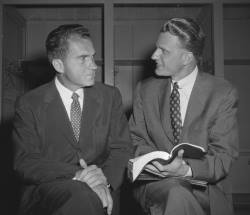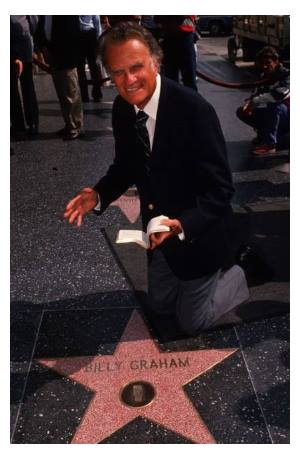
Three weeks ago Billy Graham passed away. For millions, he was a pillar of faith, and a paragon of authentic Christianity. (The eulogies of adulation have been everywhere.) My own assessment of his legacy, for what it’s worth, is somewhat different. I’m not here to speak ill. It is possible to have a particular regard for someone but question some of the crop.
Prior to Billy Graham’s ascension to mega-star Evangelist, he sold Fuller brushes door to door. After his own conversion at a tent meeting revival, he attended Florida Bible Institute, and while there, so the story goes, rehearsed his sermons by a swamp before a congregation of bullfrogs.
When Billy practiced on bullfrogs
he preached with great
gesticulation of limbs and frame,
Are you frustrated, bewildered?
And the frogs said,
Well, we’re frogs Pastor,
some frustrations come with the calling.
And considering the huge concept of you
standing here at our swamp,
clutching a Fuller brush microphone
and windmilling your Holy Bible,
how can we avoid bewilderment?
Are you dejected? cries Billy,
breaking under the strains of life?
No, this we’re not Reverend.
It may appear so,
by the melodramatic droop
of our mouths,
our flat heads,
our bleary and bulging eyes.
But we are simply taciturn,
viewing our fluid lives
through our nictitating membranes,
accepting of our viscous place
here in the verdant tarn.
Listen for a moment to me! pleads Billy,
arms out, palms up, fingers spread,
Say yes to the savior tonight,
and in a moment you will know
such comfort as you have never known.
Please take no offence Pastor,
your alter call is flawless,
emotionally evocative,
and psychologically persuasive,
but here, as we sit blinking in bright sludge
like God’s own Buddha’s,
like tiny Italian tenors,
we are comfortable and at peace.
We have found our purpose,
our eco-balancing-act of pond preservation.
Still, we applaud your desire
to see hearts changed, filled, freed.
But if you want bells to clap,
or signs, like marsh gas, to flash
and make us tremble within, then,
help save our bog!
For beyond the hills we’ve heard
the sound of bulldozers,
we’ve seen the stacks go up,
we’ve taken in, through our skin,
our first taste of toxin.

What we’re saying Billy, is that
if preaching personal salvation
precludes a sacramental view of creation;
overrides the duty of social stewardship,
skips the connection of cultural reform;
if concern over the private sins of people
blinds you to the national sins of militarization,
neocolonialism, corporatization
and normalization of greed,
tolerates prayerful endorsements of war,
and leaves you a pleaser of Presidents,
then, respectfully, Reverent,
we advise you to keep selling brushes.
Yes, we are mere frogs, Billy,
but allow us our quid pro quo: we see
your innocence, your empathy, your steady faith,
your youthful zeal for transcendent truth,
your Great Commission conviction,
all ripe for picking,
here at the cusp of your calling;
but too, we know sweet water from slick
fresh air from methane mist.
So, if you’ve an ear to hear,
say yes to the whole teaching:
learn the way of imperfection,
the slow undoing of striving,
of stature and status in temples of power,
and in time you’ll know the emancipation
in deifying the idols of an ersatz Christian nation,
and escape the coronation of: America’s Pastor—
to preach the way of radical equality
and justice for all oppressed,
although, if this
you do,
you’ll risk
being shot.
A note: I recognize that for most, Billy Graham’s legacy is unambiguous: the good he did in helping change individual lives far outweighs any failings. As well, his moral integrity was seen to be above reproach in that he avoided the sex and money scandals of other well known Evangelists. Still, there’s another side. While he maintained an apolitical message in public, in private he was entirely comfortable providing foreign and domestic policy advice through his friendships with a line of Presidents. For Graham, and here he cited Romans 13, political decent was disloyalty to the ruling government and a sin against God. Which put him in direct contrast to people like Edward Murrow, Philip and Daniel Berrigan and Martin Luther King.

He was a supporter of McCarthyism, and a supporter of every American armed conflict, most notably the Vietnam war. And while he made important overtures regarding anti-segregation, when push came to shove, he opposed Martin Luther King’s civil disobedience and approved of the police tactics that dealt with it. His dedication to ministry and apparent integrity, although laudable, still doesn’t excuse, in my view, his willing involvement in political intrigue.
But I ask myself, does any of this matter? Sadly, I think yes. I recognize there were other forces at work, but arguably (naively?), he helped give today’s (American) Evangelicalism its dualistic, nationalistic, tribalistic shape. Subsequently, 80 percent of white adherents of this religious brand recently voted in, what is for most conscientious people, the antithesis of a President. Among these adherents and ardent supporters is Graham’s eldest son, the inheriter and new leader of the BGEA.





